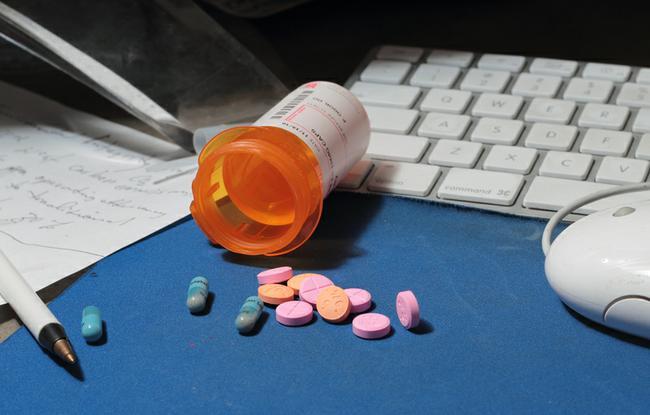Cramming, especially when finals week is sitting on the doorstep of many students’ minds, is a necessary evil for some. Many will seize any opportunity to push through a sleepless night with textbooks and notes in hand.
The opportunity often comes in the form of drugs prescribed to patients who exhibit symptoms of attention deficit hyperactivity disorder, or ADHD. Although the disorder is commonly called ADD, that term is now considered out-of-date, as the definition of the disorder has been updated.
Sales of stimulants that treat ADHD rose exponentially over the past five years, according to the health care information company IMS Health. Since selling $4 billion worth in 2007, sales rose to $9 billion in 2012.
The spike in the industry and resultant availability of the stimulants is an issue the Wellness Resource Center has had to address over the past two to three years, Director Kim Dude said.
“I think that students have a misperception that it is safe and that it’s a good idea,” Dude said. “Both of those are incorrect.”
Despite knowledge that students are using, no students have come forward portraying the negative effects of the stimulants that the Wellness Resource Center describes and warns about, Dude said.
Both the MU Student Health Center and the MU Counseling Center were unable to comment on the effects of stimulants on students, their prevalence on the MU campus or the prescription process.
The drugs are often abused in two distinct ways, Dude said. The first way is to counteract the effects of alcohol and other depressants, while the other is to resist the temptation of sleep and distractions.
The latter is more closely associated with the fervent studying period prior to and during finals week.
A female student, who will remain anonymous, said she often uses a single dosage before studying for multiple tests.
According to Partners in Prevention, possession of a prescription medication that it not your own and is a controlled substance is classified as a Class C Felony — up to seven years in prison and/or a $5,000 fine.
“Personally, I probably use Adderall once every two weeks,” she said. “For finals week, I’ll probably take more. This last week I took two, the week before I didn’t take any.”
The student discovered Adderall as a senior in high school when she worked at a restaurant that employed many college students. Some of them would take the drug in order to pull double shifts or stay up later during a night out, she said.
For her, it was luck, more than heightened availability, that led her to the drug. There are some students who don’t have the ties to sellers she has established but still crave the drug and would take it everyday if they could, she said.
When she does buy, it is from students who have received a prescription from a doctor. The types of stimulant and dosage vary by the seller.
“I prefer Vyvanse, but in Adderall you can get 10, 20, 30, 40 or 60 milligram amounts,” she said. “You can get time release ones which last the whole day, or (you) can get immediate ones that last four hours. Just depends on whoever you’re getting them from.”
One dealer of Vyvanse, a male student at MU who will remain anonymous, tried Adderall before he sought out a doctor from whom he could seek a prescription, he said.
“I had a hard time retaining things that I would read,” he said. “My mind would wander, and I would have to go back and re-read the chapter to get anything out of it.”
The first time he took Adderall, he described it as a scene in the HBO show “The Sopranos” where the protagonist, under the influence of opium, envisions a slowed-down reality at a roulette table.
After finding a doctor, he sat down with him and explained the symptoms he was feeling — how retaining information was a constant challenge. After taking his blood pressure, the doctor prescribed him Vyvanse. He’s had it since 2011.
At first, no one interested in purchasing his Vyvanse approached him, he said. That changed around the first finals week when he had the prescription.
“A couple friends who needed to cram for an 8 a.m. final followed by a 10 a.m. final — they hadn’t gone to class so they just really needed to have a cram session — so they asked if they could buy a couple off of me, and I said sure,” he said.
After completing the transaction, the dealer said he didn’t see anything wrong with what he had done, despite the legal ramifications.
If he were to be caught selling prescription drugs, it would be considered a Class A Felony in Missouri, which carries a minimum sentence of 10 years in prison. MU students found to be in possession of a drug that is not prescribed to them can face probation at the hand of the Office of Student Conduct, mandated counseling with a health care professional or community service, according to Partners in Prevention.
The female user said there are some negative effects when taking the stimulants. For example, she’s reported that when coming off the drug after a consistent dosage, it’s common to experience an “Adderall hangover,” a groggy state when the body is deprived of energy.
The energy deprivation can be attributed to the suppression of hunger the stimulants cause, making it important to remind oneself to eat and drink while on the drug, said the dealer.
As finals draw closer, he said that he has had friends approach him within the last couple days asking for pills in order to prepare.
“It’s not until the end of the semester when people start asking for it,” he said.
_Jill Deutsch contributed to this report._








